Looking back on seven decades of service, Mark Greene says it was the Queen’s steadfast faith in Jesus that made all the difference to her mighty reign
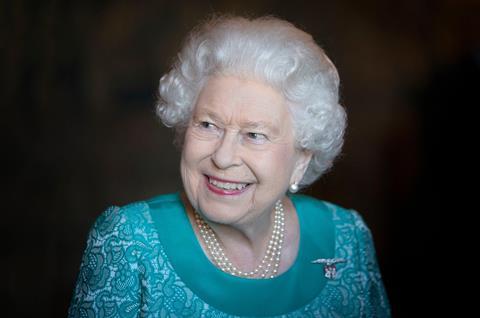
The first time I ever thought seriously about the Queen was when God told me to.
It was 2015. Elizabeth was 89. I had asked God a specific question: “Please show me someone in the public eye who is an outstanding whole-life disciple of Jesus, someone whose faith shapes all they do and say.”
“Elizabeth,” was God’s answer. Swift, sure, weighty.
Since that day it has become ever clearer to me that Elizabeth was a gift from God – to our nation, the Commonwealth, and indeed the global community. A beacon of humility, grace, astuteness, good humour, generosity and deep faith – God’s woman, God’s servant, God’s Queen.
Like many, I suppose, I’d never been a ‘royal-watcher’. I admired the Queen, and appreciated the clarity and warmth with which she spoke almost every Christmas of her trust in Christ and the difference he made to her life. But I hadn’t thought deeply about how God might be working in and through her. Yes, she was a remarkable woman and a remarkable monarch, but what I came to see, and had confirmed by others who knew her better, was that she was first and foremost a remarkable disciple of Christ. As such, she offered us an extraordinary example of consistent godliness in one of the longest and most public global ministries in the history of the world.
Inspired by Christ
Since her death, our screens and papers have been filled with eulogies: from family and friends, from former prime ministers, commonwealth heads, religious leaders, royal correspondents, racing aficionados, fashion designers, celebrities, honourees and former staff, to name just a few. We have heard of her extraordinary dedication to duty, of her dignity, of her diligence, of her capacity to change with the times, of her astute leadership of the Royal Family, of her curiosity and intelligence, and her ability to make almost anyone feel comfortable and – more importantly – valued.
We have heard of her contribution to international relations, to trade deals, to tourism, to the Commonwealth, to public morale. We have heard of her emotional resilience as she dealt with bereavement, and a fire, and the divorces of three of her children, and many a scandal along the way, not least surrounding Prince Andrew. We have heard of her capacity to forgive, not just shaking the hands of people responsible for killing her soldiers and her husband’s mentor, Lord Mountbatten, but doing so with great grace and a warm smile, like someone who rejoices in peace and reconciliation.
But there hasn’t been much about what made her the woman she was. There’s been little attempt by the mainstream media to look at her life through the lens of what she said made the biggest difference to her – her faith in Christ.
There can be few greater indications of God’s mercy and grace to our nation than to have given us the Queen
Indeed, about that, she was crystal clear, and repeatedly so. In her 2014 Christmas broadcast she put it this way: “For me, the life of Jesus Christ, the Prince of Peace, whose birth we celebrate today, is an inspiration and an anchor in my life. A role-model of reconciliation and forgiveness, he stretched out his hands in love, acceptance and healing. Christ’s example has taught me to seek to respect and value all people of whatever faith or none.”
Brilliantly, in an age that is on the one hand increasingly secular, and on the other, fraught with religious conflicts, her approach was winsomely inclusive. She pointed to Jesus and how he expanded her capacity to love people with different beliefs. Her approach was testimonial, not argumentative. She told the world the inspiration that Jesus had been in her own life and left the world to decide if they were interested in being inspired themselves: “I hope that, like me, you will be comforted by the example of Jesus of Nazareth who, often in circumstances of great adversity, managed to live an outgoing, unselfish and sacrificial life. Countless millions of people around the world continue to celebrate his birthday at Christmas, inspired by his teaching. He makes it clear that genuine human happiness and satisfaction lie more in giving than receiving; more in serving than in being served. We can surely be grateful that, two thousand years after the birth of Jesus, so many of us are able to draw inspiration from his life and message, and to find in him a source of strength and courage.”
More broadly, we can see the influence of Christ through her understanding of her job and how she approached it. At the heart of this is the extraordinary impact of one particular moment in the Coronation. It was not when the solid gold St Edwards Crown was laid on her head and she officially became Queen, but the moment that was not televised because it was deemed to be too holy for mass broadcast. It was the moment when, stripped of all her flowing robes, she knelt in a simple white dress and was anointed with holy oil. It was the moment when she dedicated herself to God to serve him by serving her people.
At one level, her Queenship was an accident of birth, an inevitable consequence of her uncle’s abdication, but she saw it as God’s will, as God’s calling, and therefore as something that she would need his help to do. It was a calling she embraced. Wholly. Royal biographer William Shawcross wrote: “She found, like her mother before her…an almost sacrificial quality at the heart of the service.”
A living sacrifice
Sacrifice is at the heart of the gospel – Jesus giving his life for ours – and it is also at the heart of our own discipleship – taking up our cross daily to follow him. But sacrifice is intertwined with service. We no longer live for ourselves but for God and others, and that is what characterised Elizabeth’s approach, not only to her own work, but to her understanding of citizenship. At Christmas 2012, for example, she said: “This is the time of the year when we remember that God sent his only Son ‘to serve, not to be served’. He restored love and service to the centre of our lives in the person of Jesus Christ.” In other words: we are meant to be there for one another.
Her broadcasts to the nation tended to highlight the particular qualities she valued – resilience, kindness, neighbourliness. They were qualities she’d seen in the wartime generation. When she spoke to Britain during the Covid pandemic, she focused on those qualities, summoning us to live up to our heritage: “I hope in the years to come everyone will be able to take pride in how they responded to this challenge. And those who come after us will say the Britons of this generation were as strong as any. That the attributes of self-discipline, of quiet good-humoured resolve and of fellow-feeling still characterise this country. The pride in who we are is not a part of our past, it defines our present and our future.”
She offered us an extraordinary example of godliness in one of the longest and most public ministries in the history of the world
Intrinsic to that understanding of ‘fellow-feeling’ was her understanding of what it meant to be a good neighbour. Time and again in her Christmas addresses she referred to the parable of the Good Samaritan (Luke 10:25-37), exhorting us to serve our neighbours and our country in whatever role we found ourselves. Indeed, in her festive address in 1980 she offered a comprehensive picture of neighbourly citizenship that is unmatched in contemporary public rhetoric. Even Barack Obama was never so far-reaching in communicating what it means to be a good citizen. That address highlighted unselfish service as the key, and she cited examples from every sphere, from healthcare to the armed forces, from central government to voluntary organisations, from hospital staff to neighbours caring for neighbours. And then she closed that section of her speech with these words: “To all of you on this Christmas Day, whatever your conditions of work and life, easy or difficult; whether you feel that you are achieving something or whether you feel frustrated; I want to say a word of thanks. And I include all those who don’t realise that they deserve thanks and are content that what they do is unseen and unrewarded. The very act of living a decent and upright life is in itself a positive factor in maintaining civilised standards.”
It is as if the Queen had internalised the truth of Colossians 3:17: “And whatever you do, whether in word or deed, do it all in the name of the Lord Jesus, giving thanks to God the Father through him.” How refreshing to find a global leader who recognised so clearly the value and beauty of a life lived kindly.
The family of nations
Elizabeth’s understanding of her role and our nation’s role in the world were, it seems, similarly shaped by a robust biblical framework. In 1957 she said: “I cannot lead you into battle, I do not give you laws or administer justice but I can do something else. I can give you my heart and my devotion to these old islands and to all the people of our brotherhood of nations. I believe in our qualities and in our strength. I believe that together we can set an example to the world which will encourage upright people everywhere…”
In the context of Britain’s imperial past, this is a remarkable vision. It is not a vision of military superiority, economic dominance, ideological hegemony, creative brilliance, or sporting excellence, but of moral example, a vision that would not inspire envy or fear but encourage generosity, justice, kindness, ‘uprightness’. It is similar to God’s original hope for the people of Israel in the Bible, that they would be “a light to the nations” (Isaiah 49:6, RSV). Britain’s military power may have diminished, but for Her Majesty size really didn’t matter – even as the granddaughter of a king who had ruled over a quarter of the planet. What mattered was the quality of our example.
We see a similarly robust vision in her commitment to the development of the Commonwealth, arguably one of her greatest achievements. When she became Queen, it consisted of eight nations, primarily ruled by white men. Today, it consists of 56 independent countries, some of which are led by women.
How do you turn nations you have conquered, ruled and exploited for decades into friends? How has it happened that, in our deeply fractured world, more than 50 nations should choose to meet regularly, not out of military expediency or economic self-interest, but out of a commitment to a common vision for a different kind of world?
The short answer is through the determination, the warmth and the relational skills of the Queen. Soon after she ascended the throne in 1952 she said: “The Commonwealth bears no resemblance to the Empires of the past. It is an entirely new conception, built on the highest qualities of the spirit of man: friendship, loyalty and the desire for freedom and peace. To that new conception of an equal partnership of nations and races I shall give myself heart and soul every day of my life.”
It was another promise she would keep. At the Silver Jubilee in 1977, she said she had witnessed: “From a unique position…the last great phase of the Empire into Commonwealth and the transformation of the Crown from an emblem of dominion into a symbol of free and voluntary association. In all history, this has no precedent.”
Where did the Queen get such a vision? It was an idea that belonged to neither the left nor the right. In reality, it comes straight out of the biblical promise of a day when the tanks will be turned into tractors, or as Isaiah 2:4 puts it, “swords into ploughshares”. A day when nation will not fight against nation, when peace will reign across the globe. Elizabeth knew that it would only be fully realised when Christ returns and creation is renewed, but that did not stop her working to create a context in which understanding could grow, cooperation flourish and inequalities be addressed now.
God saved the Queen
And if all that were not enough, she seemed to really enjoy life – riding and horses, dogs and family, nice clothes and mimicking people, and the occasional gin before lunch. But even in the way she chose to spend her leisure time we saw her Christian devotion expressing itself. She didn’t have to invite a different pastor for every weekend of her six-week Balmoral holiday, but she did. She didn’t have to drive herself to the Sunday service in the church on the Sandringham estate when she was there, but she often did. She didn’t have to find out the names of the Sunday school prize winners and choose and present their prizes, but she did.
There’s certainly no doubt about the identity of the King our Queen served. Nor is there any doubt that the prayer her people have so often prayed for her (perhaps without realising that it was a prayer) was answered. God saved our Queen.
Our Queen was “gracious” and “noble” and “victorious” in the things that really matter – hope and faith in Christ, love of God and of the people she was empowered to serve. Indeed, there can be few greater indications of God’s mercy and grace to our nation, despite our idolatrous turning away from him, than to have given us a Queen who loved us so faithfully and pointed us to him so clearly.
Praise be to the God and Father of our Lord Jesus Christ for the gift of his servant Elizabeth.
And may God grace our King in his reign as he graced his mother in hers.



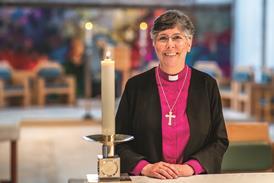

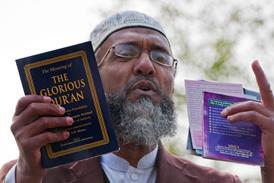
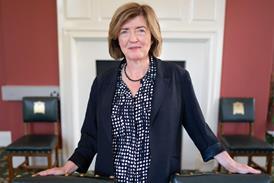

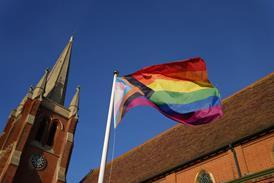
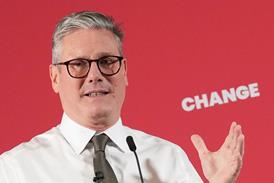




























No comments yet